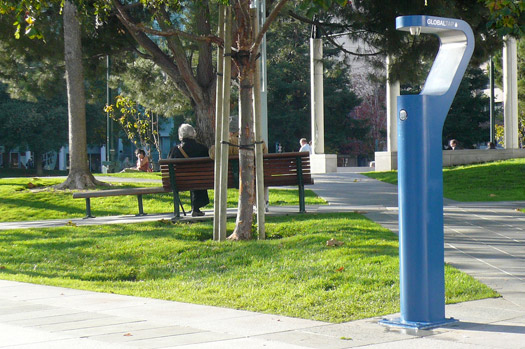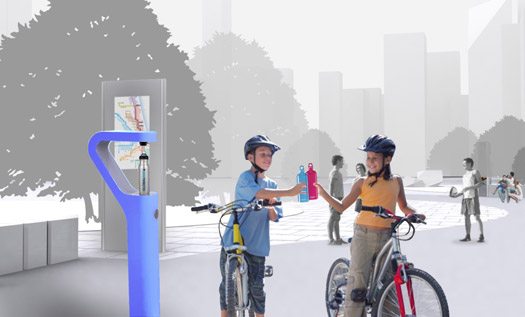
GlobalTap pilot dispenser in Yerba Buena Gardens, San Francisco. Courtesy IDEO.
More than 1 billion people worldwide lack access to clean water. The rest of us have an unlimited flow from the tap. Daniel H. Whitman, a Chicago architect and social entrepreneur who believes that access to water should be a fundamental human right, wants to link these two extremes. In 2008, he formed GlobalTap, a for-profit social enterprise with a dual mission: to sell and install tap-water-refilling stations in public places in North America and Europe, and then to divert revenues from this business to fund badly needed water projects in developing countries. “Water should be free and accessible to everybody,” Whitman says. “Water is not just for privileged people in privileged places.”
GlobalTap’s first phase began in a very privileged place, San Francisco, where a pilot project was launched last year with the installation of a refilling station in Yerba Buena Gardens. Not any ordinary looking water fountain, this one was designed by IDEO with a slim 5-foot-high steel stem, a thrusting elbow shape and a nozzle that directs a stream of water into the bottle when activated by a button. Its form and mechanism are meant to appeal to the new water-bottle-toting generation as a way to encourage bottle reuse and reduce plastic waste. The palette — blue is currently installed and orange is being contemplated — make the refilling station conspicuous in settings such as parks, lakefronts, bus stops and train stations, among the many urban sites under consideration. “We wanted a bold look that pops out of the background,” says Tasos Karahalios, the GlobalTap project leader in IDEO’s Chicago office.

Rendering of refilling station in urban context. Courtesy IDEO.
Refilling stations became a focus of attention after Whitman and IDEO designers looked at the sorry state of public drinking fountains. Poorly maintained and grungy, drinking fountains have fallen out of use or have been decommissioned altogether. If you can ever find a fountain, Karahalios adds, “they’re usually filled with sand and dirt and leaves and a kid has left their gum there.” The refilling station’s height means it’s less likely to collect debris and is therefore more hygienic.
Bringing clean water to the Third World will be much trickier, of course. Refilling stations tap into local water supplies, which is fine in Northern California but impossible in countries that lack any water delivery infrastructure. Moreover, people in these countries need huge amounts of water every day for washing, cooking and drinking, and a means to easily transport heavy containers of water home — issues that are being addressed in a number of water projects now under way.
Whitman acknowledges these hurdles and says that at first “a large portion” of revenues from the sale of the refilling stations — which cost around $3,500 each — and GlobalTap-branded stainless steel water bottles, will be directed to nonprofits already working on water projects in developing countries, such as Blue Planet Run. Another idea is to use the refilling stations in Third World countries if they can be equipped with special filtration systems that ensure that the water is not contaminated.
The overall viability of GlobalTap depends on scaling up phase one by getting cities to back the plan with perhaps hundreds of refilling stations, in a similar way that cities are installing charging stations for electric cars. Then the trickle-down effect could help alleviate chronic water shortages in underdeveloped countries, either directly or indirectly through third parties. For Whitman, the goal is to connect the haves and have-nots of water supply and redress water inequality. We have the potential, he says, “to reach a place where people everywhere can trust the source of their water.”
